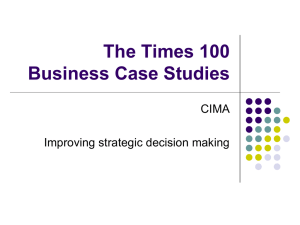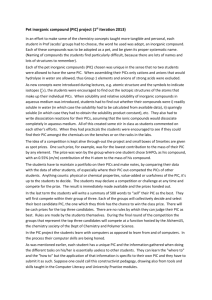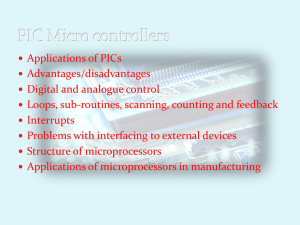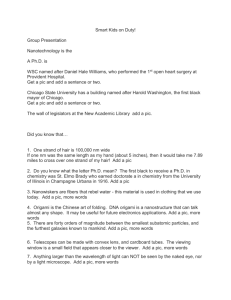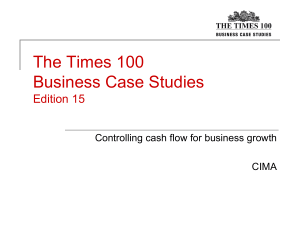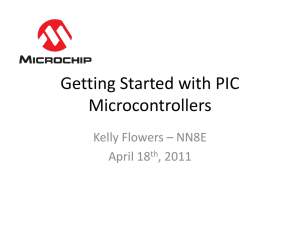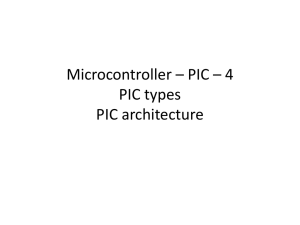Morris - Scrivener - Trundle - Pentney
advertisement
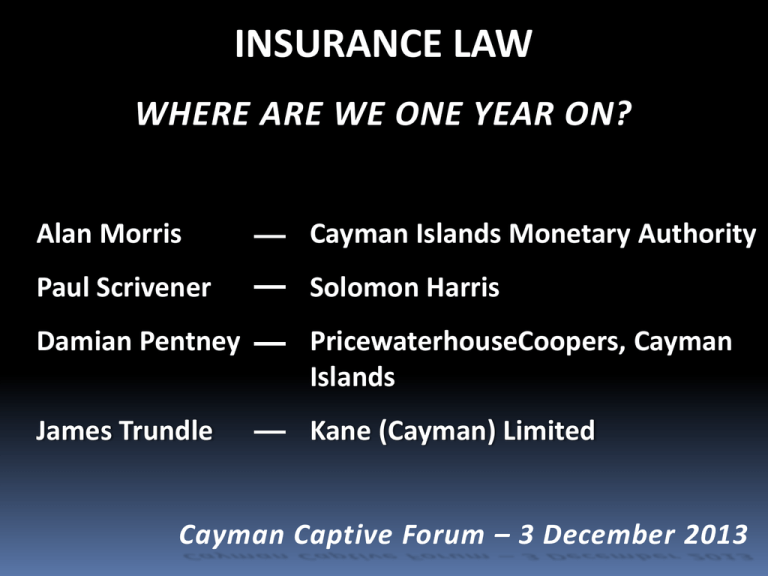
INSURANCE LAW WHERE ARE WE ONE YEAR ON? Alan Morris Cayman Islands Monetary Authority Paul Scrivener Solomon Harris Damian Pentney PricewaterhouseCoopers, Cayman Islands James Trundle Kane (Cayman) Limited Cayman Captive Forum – 3 December 2013 TODAY’S TOPICS Regulator’s overview of where we are one year on Portfolio Insurance Companies and the Class B(iv) Licence An auditor’s perspective - Portfolio Insurance Companies and the new auditor whistle-blowing obligation “Hot Topics” – what keeps a captive manager awake at night? 2 CIMA Regulatory Perspective – New Insurance Law New Insurance Law Retrospective Review International Regulatory Developments IAIS NAIC IMF Solvency II CIMA Current Perspective CIMA Additional Regulatory Initiatives 3 The Next Logical Step for SPCs Cell is not a separate legal entity Drawback – intra-cell contracting not possible; uncertain tax status of unincorporated cells Enter the “portfolio insurance company” or PIC! 4 Amending Legislation Insurance (Amendment) Law passed on 25 March 2013 but not yet in force pending amendments to Insurance Regulations Insurance specific – part of the Insurance Law An SPC can incorporate one or more of its cells by establishing a Portfolio Insurance Company (PIC) PIC is an exempted company beneath a cell and, generally, “replaces” the cell 5 Participant Participants Participant Participant Core Cell A PIC A Cell B Cell C PIC B PIC C 6 Participant Participants Participant Participant Core Cell A Cell B Cell C PIC A 7 Advantages of a PIC Unlike a cell, a PIC is a separate legal entity Contracting and risk pooling between cells and core Greater certainty of IRS treatment Easier for counterparties to understand Board representation at PIC level (c.f. for a cell) Easier transition to stand-alone captive 8 CLASS B(IV) LICENCE Provided for in insurance (Amendment) Law, 2013 – not yet in force Why do we need a B(iv)? Effectively, breaks down the “old” B(iii) into B(iii) and B(iv) B(iii) – 50% or less of net written premium is related business and annual net earned premiums are less than US$20 million B(iv) – 50% or less of net written premium is related business and annual net earned premiums are equal to or greater than US$20 million 9 Insurance Law 1 year on – an Auditors view • Portfolio Insurance Company’s (PICS) - Scope of audits - Specific accounting considerations • The transitional period • Auditor whistle blowing obligations • - the requirements - tipping off? - the implications for auditors The “Management letter” 10 HOT TOPICS – Solvency & Capitalization Why is MCR and PCR for a single parent captive set at a modest US$100,000 bearing in mind the common 5:1 premium to capital ratio? What is the process for transitioning between different classes of licence having regard to changing levels of unrelated business and what is the timeframe for meeting new capital and solvency requirements? Section 7(2) of the Regulations refers to “enhanced capital requirements”. Could this be clarified? 11 HOT TOPICS – Solvency & Capitalization Which capital requirement is used when assessing what is available for an entity to pay out as a dividend? If an insurance entity has subsidiaries both on and off island, does CIMA look at the consolidated group when assessing solvency? 12 HOT TOPICS – SPCs & PICs If an SPC is writing unrelated business and holds a Class B(iii) Licence, is the solvency test applied on a consolidated basis or on a per cell basis? Perhaps an SPC has 4 inactive cells, 2 writing related business and one writing unrelated business, with the latter representing over 50% of overall premium. How would this be handled? Is it possible for an SPC to hold two different licences? What are the practical applications of PICs and how will solvency requirements be applied to them? Do the audit firms anticipate any changes to the audit approach for PICs as compared to SPCs? 13 HOT TOPICS – Reinsurance & the Class B (iv) What has been the reaction from the reinsurance industry to the new Class D license and how is Cayman working to attract reinsurance companies? Is there any scenario where a single parent captive would be licensed and regulated as a Class D? What will the licensing fee be for a Class B (iv)? 14 HOT TOPICS – Class C – the SPV SPV formations appear to have fallen off year on year, whereas Bermuda is seeing an increase in this business. What are the panel’s thoughts on why this is and what the future holds in this area? 15 HOT TOPICS - General Are further changes to the regulation of Class B and Class C Licensees anticipated given the ongoing developments in international regulation? There has been a significant increase in CIMA inspections in the last year or so. What findings are CIMA able to share as areas for captives and managers to focus on? 16 QUESTIONS?

